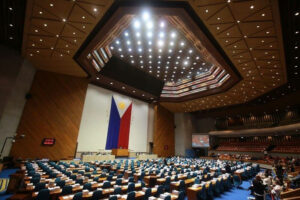By Beatriz Marie D. Cruz, Reporter
A HOUSE of Representatives panel on Tuesday restored the local tax on both local and foreign companies under proposed changes to the Corporate Recovery and Tax Incentives for Enterprises (CREATE) Act, as requested by Philippine President Ferdinand R. Marcos, Jr., according to the Ways and Means Committee chairman.
Under the report approved by the committee on Tuesday, corporations will now have to pay 2% local tax — from the original 1.5% proposal — on top of a 20% income tax.
Albay Rep. Jose Ma. Clemente S. Salceda, who heads the ways and means committee chairman, told a hearing the President had asked them to restore the local tax “in lieu of all local taxes to be collected by investment promotion agencies for concerned local government units.”
House Bill (HB) No. 9794, also known as CREATE MORE (CREATE to Maximize Opportunities for Reinvigorating the Economy), seeks to amend Republic Act (RA) No. 11534 or the CREATE law. The measure will be sent to the plenary soon for debates.
Eleanor L. Roque, tax principal at P&A Grant Thornton, said lawmakers should ensure that the local business tax rate for companies with incentives should be lower than the regular rate for companies without incentives.
“If you look at the local business tax rate based on the Local Government Code, the rate varies from 0.375% to 2%, so lawmakers should compare the rates to arrive at a logical incentive rate,” she said in a Viber message.
The Ways and Means Committee also introduced several changes to the committee report, such as value-added tax (VAT) exemptions for enterprises whose total sales are solely for export, and including a list of local tax exemptions following the imposition of a registered business enterprises’ local tax.
Another amendment is to turn the Fiscal Incentives Review Board (FIRB) into a review and monitoring body for investment promotion agencies (IPA).
The bill seeks to limit the FIRB’s power to approve or deny incentives, and to reinstate the power to grant tax incentives to IPAs.
Lawmakers also agreed to incorporate the Organization for Economic Co-Operation and Development’s (OECD) Base Erosion Profit Shifting (BEPS) framework for multinational enterprises in the CREATE MORE bill.
“Under the current OECD, the US, Japan, Korea, China and Singapore are major investors… They’re already implementing the 15% global minimum tax so if they are given an income tax holiday and they don’t pay anything, when they return to their home country, they will have to pay the 15% [global minimum tax,] so our income tax holiday is useless,” Mr. Salceda told the committee.
Finance Assistant Secretary Juvy C. Danofrata said the Philippines would “lose out” if it does not recognize the 15% global minimum tax implemented in OECD countries.
“If we don’t make amendments to our tax system, what will happen is if we give an income tax holiday to a multinational that is also paying its taxes in other countries, the tax that we don’t collect will eventually be paid in the other country,” she said in mixed English and Filipino.
The CREATE MORE bill seeks to impose a 20% corporate income tax on local and foreign corporations under the enhanced deduction income tax regime.
“The incentive really for the enhanced deduction is to encourage them to get more employees to invest more because there’s also an incentive on the capital investment,” Ms. Danofrata told the committee.
Under the bill, domestic and export companies, including those inside ecozones and freeports, will be entitled to duty exemptions, VAT exemption on imports, and VAT zero-rating for local purchases.
Enterprises would also be entitled to a 200% additional deduction for power costs during the income tax holiday period. They may also enjoy a 100% additional deduction in expenses for trade fairs, missions or exhibitions.
VAT incentives for companies that enjoy incentives before the enactment of CREATE will be extended from 10 to 12 years, if there is no tax refund or credit granted. They may also enjoy duty incentives for the remainder of the 10-year transitory period.
“We gave two more years because the BIR (Bureau of Internal Revenue) has been coming up with all RMCs (revenue memorandum circulars) that of course negate the benefits that accrue to those that we have provided incentives to but went through a transition,” Mr. Salceda said.
The bill also allows the information technology and business process outsourcing sector to “conduct business under alternative work arrangements.”
The bill also seeks to include the Bangsamoro Board of Investments and the Bangsamoro Economic Zone Authority under the list of investment promotion agencies.
Mr. Salceda said the bill also proposes to grant an income tax holiday to domestic market enterprises in creative industries listed under RA 11904 or the Philippine Creative Industries Development Act “for as long as they have at least a minimum of $500 million.”
Filomeno S. Sta. Ana III, coordinator of Action for Economic Reforms, said issues with the CREATE law could be fixed under its implementing rules and regulations.
“Sure it has imperfections, but its flaws can be corrected through implementing rules and regulations and other administrative measures. We should not forget that CREATE lowered the corporate income taxes for all business enterprises,” he said in a Viber message.
He earlier said a looming fiscal crisis due to a “generous tax incentive system” could “block the new flow of investments and thus impede growth and employment.”
